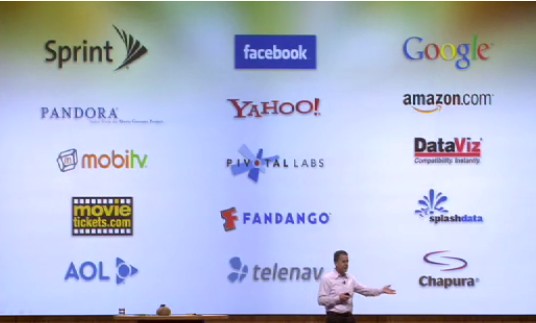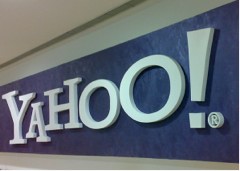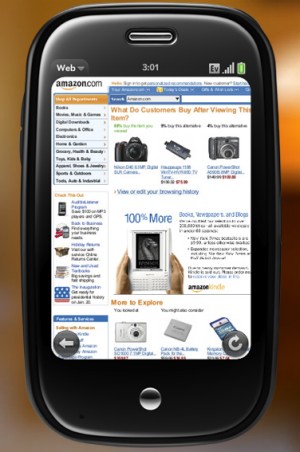Partners in Precrime, Part 2
 Third-party software: the secret sauce of smartphones that keeps us gadget-addicts coming back for more geeky goodness. Last week, we took a stab at guessing how Sprint, Facebook, Google and Pandora were going to integrate with the shiny new Palm webOS. This time around, in part 2 of our ongoing series analyzing Palm's publicly-announced software partners, we'll put Yahoo!, Amazon, MobiTV, Pivotal Labs and DataViz under the microscope.
Third-party software: the secret sauce of smartphones that keeps us gadget-addicts coming back for more geeky goodness. Last week, we took a stab at guessing how Sprint, Facebook, Google and Pandora were going to integrate with the shiny new Palm webOS. This time around, in part 2 of our ongoing series analyzing Palm's publicly-announced software partners, we'll put Yahoo!, Amazon, MobiTV, Pivotal Labs and DataViz under the microscope.
So grow your hair long, let your beard go wild and help yourself to some Lysergic acid from that dodgy-looking man in the trench coat as we once again take a trip into the Realm of Tech Fantasy…

webOS's rap sheet
webOS 101
As with last time, let's first recap what we know of the webOS:
- Applications will be built using well-known web technologies: HTML5, CSS and Javascript. Although webOS is Linux-based, "native" development in C will not be an option – at least at first. Palm have created all their own in-built applications with these languages. As Ed Colligan put it: "We're eating our own dog food here."
- Applications will be able to run in the background – enabling "true" multitasking as we see on Windows Mobile, rather than the more limited multitasking available on PalmOS (which doesn't really multitask at all) and iPhone (which does not allow third-party apps to run in the background).
- Applications will have open access to your PIM data – so contacts, calendar, email and messaging are all fair game. webOS's "Synergy" concept means it will be able to integrate data from multiple web services into one view.
- Applications will have access to the innovative pop-up notification area, giving you some limited control over what they're up to at all times, no matter what else you're working on.
Ready? As The Tenth Doctor would say: allons-y!
Yahoo!
 Who are they? Worldwide, the yahoo.com portal is the most-visited website. Second only to Google in search and número uno in webmail, Yahoo! are definitely a company you'd want to have on board if you were making a web-focused phone. In addition to the aforementioned search and email, Yahoo! also offer a massive range of other web services, including the hugely popular Yahoo! Messenger (with over 248 million users), maps, Flickr, Yahoo! Music, and an ass-load of co-branded news content.
Who are they? Worldwide, the yahoo.com portal is the most-visited website. Second only to Google in search and número uno in webmail, Yahoo! are definitely a company you'd want to have on board if you were making a web-focused phone. In addition to the aforementioned search and email, Yahoo! also offer a massive range of other web services, including the hugely popular Yahoo! Messenger (with over 248 million users), maps, Flickr, Yahoo! Music, and an ass-load of co-branded news content.
How will they integrate with webOS? Unlike Google, we haven't actually seen any demonstration of Yahoo's services on webOS, so it's an open question at this point. An obvious way would be an option to add Yahoo searches to webOS's Universal Search - if it isn't built-in to begin with. Yahoo already have their own specialized mobile search service, OneSearch, which is available as a stand-alone app for Symbian and Windows Mobile. It groups web search results into different categories rather than just giving you page after page of raw, unfiltered links and also offers a pretty nifty option to search by voice. Will Universal Search offer OneSearch as an option?
Yahoo! Mail integration is a no-brainer. At the very least, you'll have POP access via Pre's built-in email client, although whether or not you'll have to pay for it - as everyone except iPhone users have to - is up in the air. At best, we'll see a fully-featured offline client based upon the web version that can cache your mail and provide a push service. Synergy integration of your contacts is also pretty much guaranteed. We know webOS employs ‘mega-messaging' (my term – think it'll catch on?) via Synergy, integrating all your conversations with contacts across SMS & IM. Yahoo Messenger would be an obvious addition here.
Since Yahoo are also very big on news content, maybe we'll see some kind of news-ticker app, that scrolls the latest headlines on-screen via the pop-up notification area. Just tap one to launch the full article in the web browser. Or how ‘bout a stock ticker, accessing information from Yahoo Finance, that scrolls the latest stock quotes for the companies you're watching? For the information-addicted, the possibilities are tantalizing indeed.
Finally, it's also worth noting that in the demos we've seen thus far of webOS, the ‘Maps' option in Universal Search is conspicuously unbranded. Is this a hint you'll have the option to select which mapping service you use? If that's the case, we can probably expect Yahoo Maps to be one of those options, which will be able to integrate with Pre's GPS and provide location-based services, like local restaurant searches and the like.
Amazon
 Who are they? Online retail's proverbial 100-pound gorilla, Amazon.com was launched as a simple bookseller in 1994 and survived the dot-com bubble-burst and years of unprofitability to become the world's biggest online retailer, trading in everything from tiki huts to back shavers to space-age "relaxation capsules". Recently, they've expanded into the eBook space with their Kindle eReader – which, it should be noted, downloads content via Sprint, Palm's first Pre carrier partner – and digital music downloads, with a DRM-free music store that sells in good ol' mp3.
Who are they? Online retail's proverbial 100-pound gorilla, Amazon.com was launched as a simple bookseller in 1994 and survived the dot-com bubble-burst and years of unprofitability to become the world's biggest online retailer, trading in everything from tiki huts to back shavers to space-age "relaxation capsules". Recently, they've expanded into the eBook space with their Kindle eReader – which, it should be noted, downloads content via Sprint, Palm's first Pre carrier partner – and digital music downloads, with a DRM-free music store that sells in good ol' mp3.
How will they integrate with webOS? We know that webOS is going to feature a built-in client (demo begins @ 3:19) to access Amazon's Music Store, which allows you to download songs direct to your device, browse tracks by genre, flip through album art, and to stream audio previews of songs. It's obviously Palm's answer to iPhone's built-in iTunes access. Since the Pre will appear to your PC as a generic USB mass storage device, it should be a simple matter to sync any purchased tracks to your desktop media library of choice.
Apart from that, though, there's also some other great opportunities here. Let's say Amazon were to build a special webOS client for their retail store: it could automatically create calendar reminders for you, which notify you of upcoming release dates for books, movies, games or anything else you're waiting to buy. Or maybe provide an option to share products of interest with people in your contacts?
Finally, as mentioned before, Amazon have recently expanded into eBooks. Their Kindle eReader fetches content via Whispernet, which is a free wireless content delivery service provided in partnership with Sprint – who also happen to be the Pre's first carrier. Amazon have noted in the press release announcing Kindle 2 that "Kindle 2 will also sync with a range of mobile devices in the future." Will we see an ability to download eBooks direct to your Pre, and keep bookmarks in sync across all your devices – so you never lose your place?
MobiTV
Who are they? MobiTV were founded in 1999, and provide a range of video content to mobile subscribers, including live television, video-on-demand and digital music services. They have over three million subscribers, and are partners with Sprint. We reviewed their Palm OS app back in 2006, where Kris found it to be "tiptoeing the line between novelty and killer app."
How will they integrate with webOS? This one shouldn't require too much speculation. MobiTV clients are already available on Palm, Windows Mobile and Blackberry devices, and they do exactly what they say: provide decent streaming video services for a subscription fee (currently $9.99 USD per month). Sprint users – which, initially, will be everyone who buys a Pre - will get access to exclusive videos from SprintTV.
I can think of one possible way they might use the webOS technology: pop-up reminders via the notification area, telling you when your favorite shows are about to begin. Apart from that? We'll have to see how creative MobiTV are.
Pivotal Labs
Who are they? A California-based software development consultancy who've worked with a lot of big names, including Twitter, Best Buy and Salesforce.com, Pivotal Labs are working behind the scenes with other unnamed webOS developers, helping them get up to speed on webOS and the Mojo SDK. They've developed a wide variety of software development tools, including Pivotal Tracker, a web application which allows development teams to collaborate in real-time on projects. You can check out our interview with Pivotal here, where their VP of Business Development, Christian Sepulveda, shared his thoughts on webOS and the Mojo SDK.
What's their contribution to webOS? Indirect. Although they've told Palm Infocenter they'll "probably" put out an app or two themselves – and given Pivotal Tracker is a web-based tool, it is a safe bet that would be one of them - it seems they've been employed by Palm mainly to aid their other software partners in webOS development. We can make an educated guess that they were instrumental behind-the-scenes in coordinating the webOS "developer camp", which we learned about in our interview with Pandora CTO Tom Conrad. If their list of high-profile clients is anything to go by, then they'll prove to be a great asset.
DataViz
 Who are they? Anyone who's used a Palm OS device in the last couple of years will be well-acquainted with DataViz's Documents to Go, an office software suite that offers an excellent set of mobile-optimized, Microsoft Office-compatible applications: it's been built into every smartphone Palm have put out. DataViz has since spread their wings and can now be found on Android, Windows Mobile and Symbian in addition to Palm OS. Given their long history and shared success with Palm, they're an obvious must-have developer for webOS.
Who are they? Anyone who's used a Palm OS device in the last couple of years will be well-acquainted with DataViz's Documents to Go, an office software suite that offers an excellent set of mobile-optimized, Microsoft Office-compatible applications: it's been built into every smartphone Palm have put out. DataViz has since spread their wings and can now be found on Android, Windows Mobile and Symbian in addition to Palm OS. Given their long history and shared success with Palm, they're an obvious must-have developer for webOS.
How will they integrate with webOS? Good question: we don't know! Although they've told Palm Infocenter that they're "thrilled" about the positive buzz webOS and Pre have received, they're not giving up anything else at this stage. If we had to guess, we'd say some kind of online document-sharing, storage and collaboration services are in the pipeline, allowing them to compete with similar services offered by rivals like Google Documents.
If that's not the case, though, we can still expect the usual native MS Office file support, integrated with the operating system to make it a simple matter to open email-attached documents, spreadsheets etc, in addition to PDF files. A big part of the PalmOS Docs2Go is the ability to sync mobile documents with their desktop counterparts, so we'd expect to see something similar on webOS.
TO BE CONTINUED…
Join us next week for the final part of Partners in Precrime, where we'll wrap up with a look at Movietickets.com, Fandango, SplashData, AOL, Telenav and Chapura.
Article Comments
(13 comments)
The following comments are owned by whoever posted them. PalmInfocenter is not responsible for them in any way.
Please Login or register here to add your comments.
RE: Glossing over nicely ;)
I'd still like to see someone have a screen full of text and, say, copy from the next to last word on a line to the next to last word on the second following line...
Fingertips are BIG w.r..t words on that dinky screen.
RE: Glossing over nicely ;)
mega-messaging, massive messaging, mighty messaging
Nice wordsmithing - really, I've enjoyed both the articles in this series. Nice the look forward. You could keep yourself busy just digging into each of those companies' activities for the next while.
I actually posted a link to each of the articles in my own little website's link page. Check it out at http://palmprefix.com. You're writing was the first thing that kept me reading here. I've tried to do the same over there. I'd love to know what you think.
Thanks again. I'll be back for round three.
RE: mega-messaging, massive messaging, mighty messaging
that's a nicely put-together site, it's now bookmarked, rss'd and Facebooked - the latter of which entitles you to see my wonderfully, horribly graphic profile pic of me in Speedos. That's what you get! :P
RE: mega-messaging, massive messaging, mighty messaging
which entitles you to see my wonderfully, horribly graphic profile pic of me in Speedos.
That's just wrong. Seriously wrong.
"twrock is infamous around these parts" (from my profile over at Brighthand due to my negative 62 rep points rating)
RE: mega-messaging, massive messaging, mighty messaging
"twrock is infamous around these parts" (from my profile over at Brighthand due to my negative 62 rep points rating)
RE: mega-messaging, massive messaging, mighty messaging
Which app wins?
Substitute any of the other on-device devices; same question.
RE: Which app wins?
Latest Comments
- I got one -Tuckermaclain
- RE: Don't we have this already? -Tuckermaclain
- RE: Palm brand will return in 2018, with devices built by TCL -richf
- RE: Palm brand will return in 2018, with devices built by TCL -dmitrygr
- Palm phone on HDblog -palmato
- Palm PVG100 -hgoldner
- RE: Like Deja Vu -PacManFoo
- Like Deja Vu -T_W



Glossing over nicely ;)
If there is no native application access (more to point, a C compiler.. could just 'compile' to JS, or to native code. Whatever.) then it means a lot of existing code (for Palm OS and otherwise) needs total rewrite before being useful. For games, you're not going to get a Quake port 'just like that', but lets talk productivity apps like Docs2Go..
Devs won't be inheriting any of their old code; a lot of good code is easily portable, even if it was old Palm OS code - lose the UI, adopt the good parts to reusable library code, and add a new UI. Thats not going to happen if we're stuck with JS. (Not to say JS is bad, but its not going to buy you any old code, and it is a performance bottleneck for some applications. Anyway, not my target here.)
So you say 'we can expect ...' - well, only if DataViz has a special relationship with Palm (obviously they do ;) and a lot of lead time to recode eveyrthing in JS, or else a back door so they can re-use old code. If they're left using JS, its going to take a long long time to get all that functionality reimplemented from scratch. (And for non developers out there .. this isnt't being lazy. Old code has a history and likely has been debugged.) Certainly, I've got tens of thousands of lines of business logic for some of my apps that would be nice to just bring over and write the new UI for.. but it means so far that all apps are ground up new. (Which in a way is nice, since you are forced to reconsider everything.. but it sure makes for a lot more work, which translates into 'time to market' and 'cost to market'...)
These are very large questions we devs are all waiting on.
Will there purely be JS access to the device, forever, or will this be a staged release a la Apple - first JS, then down the road, a heavy duty API for those needing to write device drivers or high performance computations or the like.
jeff
The Shadow knows!